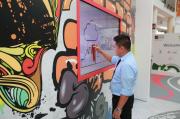|
|
|
|

|
Education Innovations in Africa Could Level Playing Field for Millions of Students in Middle East
Published Sep 25, 2016
|
African public-private partnerships are fast-tracking education improvement from primary school to university, potentially levelling the playing field for millions of students in the Middle East and worldwide.
In the face of electricity shortages and over-crowding, African public-private partnerships are integrating technology in education to enhance learning. Broadband supports tablets, laptops, and online courses to reach students with poor or no access to education, improve teacher training, and lower costs, according to a recent report by UNESCO.
For example, Africa’s e-learning market has doubled from 2011 to 2016, reaching USD 513 million, according to a report by market researchers Ambient Insights.[2] South Africa is Africa’s largest e-learning market, along with Angola, Nigeria, and Tunisia. Meanwhile, Senegal, Kenya, Zambia, and Zimbabwe are posting 25 per cent annual e-learning market growth.
“Africa is one the world’s most dynamic education markets. Public-private partnerships show best practices for using technology to reach marginalised students with technology that students use in their daily lives. Africa presents exciting business opportunities for education technology vendors and startups worldwide,” said Trixie LohMirmand, Senior Vice-President, for Exhibitions and Events Management at Dubai World Trade Centre, host of GITEX Technology Week, one of the world’s most influential technology gatherings and conferences.
Supporting technology investment in Africa, GITEX Technology Week will host the Africa Investment Forum, in partnership with Nigeria’s National Information Technology Development Authority. Over 20 African countries will show how technology can enhance verticals, support foreign direct investment in ICT, and drive economic growth.
The Arabian Gulf states and South Africa enjoy strong trade ties, especially in electronics, construction, and defence. Trade between South Africa and the UAE, where Dubai is the largest city, reached about USD 3 billion in 2015, and the governments are hoping to double its value in the coming years, according to the South African Consulate General in Dubai.
The Rumie Initiative Shows Power of Affordable Tech
African education projects are seeing the power of partnerships with local and international NGOs. The Rumie Initiative, a Canada-based NGO, has produced the Rumie tablet that is in the hands of more than 3,000 children in Africa, including in Benin, Egypt, Ethiopia, The Gambia, Kenya, Liberia, Sierra Leone, South Africa, Tanzania, and Uganda.
“Rumie saw an opportunity to give disadvantaged students access to the kind of free digital learning materials that had been available only to affluent schools in the past,” said Tariq Fancy, the founder and executive director of The Rumie Initiative, and one of dozens of educational luminaries speaking at GITEX’s Education Vertical Days conference programme.
The affordable Rumie tablet is pre-loaded with USD 5,000 worth of crowdsourced educational software and textbooks, with the impact of every dollar spent delivering 100 times the impact.
“Tablets can be sourced and distributed cheaply, the cloud provides low costs for storage, and crowd-sourced content allows educators to provide students with the local resources that best meet their needs. Rumie is now untethering content from tablets so that any student with a mobile device can learn from anywhere at any time,” added Tariq Fancy.
Joining Tariq Fancy in the GITEX Education Vertical Days programme will be Brandon Ralph, the founder and CEO of Go Creative Minecraft Services, Monica Burns, founder of the EduTech website ClassTechTips, and Mohamed Ali Hammami, Head of the Virtual Reality Section at Qatar University.
Further energising education innovation will be global technology companies, such as South Africa’s Dimension Data. African startups at the GITEX Startup Movement, the world’s most global startup event in 2016, will be able to have their business plans validated by global investors, pitch for USD 160,000 in funding, and network with fellow innovators.
The event hosted 146,000 visitors from 144 countries, including 20 per cent from Africa, and 4,200 exhibiting companies from 130 countries. For more information on the 2016 edition, running from 16-20 October 2016 at the Dubai World Trade Centre, visit www.gitex.com.
Posted by
VMD - [Virtual Marketing Department]
|
|
|

